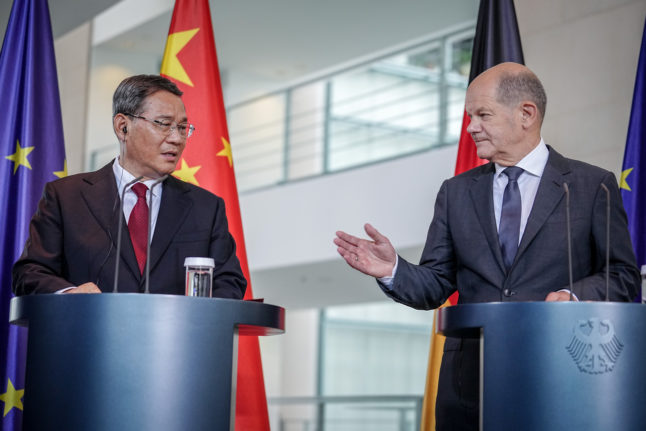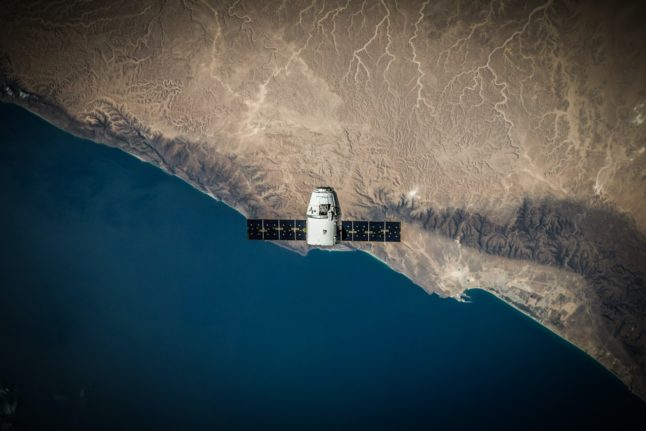Li Qiang, visiting Germany on his first trip abroad since he was named China’s Prime Minister, also underlined the emphasis Beijing places on improving relations with the European Union as criticisms from the bloc grow louder.
Burned by its reliance on Russian gas and hurt by supply chain disruptions during the pandemic, Germany has been intensifying efforts to diversify away from China. Chancellor Olaf Scholz has stressed that Germany “doesn’t want decoupling, we want de-risking”.
But he has underlined Berlin’s move to diversify trading partners, saying that Germany is “committed to actively broadening our economic relations with Asia and beyond”.
But after the United States toughened up its economic policies against China, Beijing fears its biggest partner in the EU could be headed in the same direction and using the seemingly benign talk of ‘de-risking’ to instead progressively detach itself from the Asian economy.
Investors place great stock on removing risks, Li said.
“But if it’s about using de-risking in name to carry out decoupling or carry out discriminatory measures against certain countries… then it goes against market rules and principles of a level playing field,” warned the Prime Minister.
“I think most German industry friends won’t see China as a risk and won’t agree to any so-called de-risking targeting China,” added Li.
With the global economic recovery currently lacking a “growth dynamic”, ”China and Germany, as influential and big nations, should all the more work closely together towards world peace and development,” he said.
Mistrust
Export giant Germany, by virtue of its economic might, has always enjoyed special ties with China.
Under former chancellor Angela Merkel, Berlin took a pragmatic approach of talking up economic opportunities while keeping less flattering opinions on rights and freedom behind closed doors.
That made China a key market for Germany’s exporters while also allowing Berlin to take in prominent human rights activists like Liu Xia, apparently without suffering any retaliatory consequences.
But the coronavirus pandemic raised doubts about the wisdom of relying on a far-flung partner with its own huge domestic needs for essentials from medication to surgical gowns to masks.
Russia’s war on Ukraine turned the approach of economic rapprochement on its head, and also put the spotlight on self-ruled and democratic Taiwan, which China views as its territory and has vowed to retake one day – by force if necessary.
‘Systemic rival’
Days ahead of Li’s visit, Germany in its first national security strategy, called Beijing a “partner, competitor and systemic rival”.
The blueprint also accused China of acting against German interests, putting international security “under increasing pressure” and disregarding human rights.
READ ALSO: Chinese premier visits Germany amid growing mistrust
The report by Germany’s intelligence agency also cited China as the “biggest threat in relation to economic and scientific espionage and foreign direct investments in Germany”.
The volte-face has not only alarmed Beijing. German industry also finds Berlin’s pivot easier said than done. After all, China remains Germany’s biggest trading partner.
But that also “means that if there are major upheavals between China and the West or even a war over Taiwan, the German economy as a whole will be severely endangered,” warned German newspaper Spiegel.
In a sign of the shifting attitudes, the seventh round of government consultations between the two powers was not accompanied by any major investment deals.
German Foreign Minister Annalena Baerbock has signalled that the path to cooperation could in the future be on areas on which they can agree, such as the climate — something which both sides gamely took up on Tuesday.
“China and Germany should become green partners,” said Li, while Scholz added that “close cooperation in the fight against climate change was a particular concern for us today.”



 Please whitelist us to continue reading.
Please whitelist us to continue reading.
Member comments